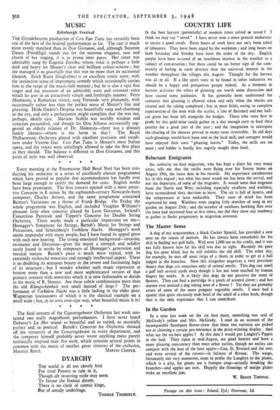MUSIC
Edinburgh Festival
THE Glyndebourne production of Con i Fan Tutte has certainly been one of the best of the festival performances so far. The cast is much more evenly matched than in Don Giovanni, and, although Suzanne Danco (Fiordiligi) stands out for the extreme elegance, ease and charm of her singing, it is as prima inter pares. Her sister was admirably sung by Eugenia Zareska, whose voice is perhaps a little dark and heavy for Mozart's clear and brilliant colour-scheme ; but she managed it so gracefully that this was no more than an occasional blemish. Erich Kunz (Guglielmo) is an excellent comic actor, with the instinctive sense of impromptu comedy which occasionally carries him to the verge of the music-hall manner ; but he is also a vcry fine singer and the possessor of an admirably even and resonant voice which he uses in an attractively simple and forthright manner. Petre Munteanu, a Rumanian visitor, sang Ferrando very pleasantly, with occasionally rather less than the perfect sense of Mozart's line and phrasing. Hilde Giiden's Despina was beautifully sung and charming to the eye, and only a perfectionist might complain that she was not, perhaps, ideally cast. Mariano Stabile was worldly wisdom and cynicism personified, and though his Don Alfonso occasionally sug- gested an elderly relation of Dr. Malatesta—there was a distinct family likeness—where is the harm in that ? The Royal Philharmonic Orchestra played with excellent precision and steadi- ness under Vittorio Gui. Cosi Fan Tutte is Mozart's most Italian opera, and the voices were unfailingly allowed to take the first place as they should. The balance is different in Don Giovanni, and this point of style was well observed.
Every morning at the Freemasons Hall Boyd Ned has been con- ducting his orchestra in a series of excellently chosen programmes which have proved so popular that accommodation has hardly ever been large enough to satisfy the demand for seats. English works have been prominent. The first concert opened with a most attrac- tive Concerto in E minor by the eighteenth-century Newcastle-born composer, Charles Avison, and the same programme contained Britten's Variations on a theme of Frank Bridge. On Friday the whole programme was English, and included Vaughan Williams's pleasant little oboe concerto played by Leon Goossens, Ireland's Concertino Pastorale and Tippetes Concerto for Double String Orchestra. Three works made a particular impression on me- Honegger's Symphony for Strings, Bartok's Music for Strings and Percussion, and Schoenberg's Verkleirte Nacht. Honegger's work seems unpopular with many people, but I have found its appeal grow with each new hearing. The strong emotional background—invasion, resistance and liberation—gives the music a strength and solidity rarely found in works by composers of Honegger's generation and musical stature. Bartok's piece is much more typical, with its extremely recherché sonorities and strongly intellectual appeal. There is no doubting its sensuous beauty or the severe and fascinating logic of its structure • but I wonder whether such music represents at bottom more than a new and more sophisticated version of that primary concern with sonorities which it is now fashionable to deride in the music of R. Strauss. Are these subtle combinations more than the old Klangschernheit writ small instead of large ? The per- formance of Verkkirte Nacht was a little lacking in the older post- Wagnerian lusciousness of which it is the classical example on a small scale ; but, in its own over-ripe way, what beautiful music it is!
The final concert of the Cqncertgebouw Orchestra last week con- tained two really magnificent performances. I have never heard Debussy's La Mer sound so beautiful and so varied, so musically perfect and so poetical. Bartok's Concerto for Orchestra showed off the virtuosity of the Concertgebouw in every department, and the composer himself probably never wrote anything more purely technically inspired than this work, which contains several points in common with the music of another great virtuoso of the orchestra,


































 Previous page
Previous page